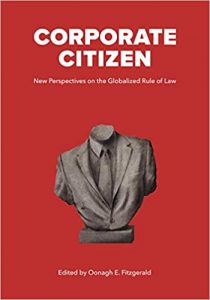In Corporate Citizen: New Perspectives on the Globalized Rule of Law, editor Oonagh E. Fitzgerald brings together contributors to explore how the notion of corporate global citizenship has enabled corporations to evade responsibilities and liabilities and block or weaken measures that might increase corporate accountability. This volume serves a valuable purpose in demonstrating the far-reaching and multi-faceted problems surrounding the governance of transnational corporations, writes Christie McLeod, and is recommended to anyone interested in corporate governance, corporate liability and corporate social responsibility.
Corporate Citizen: New Perspectives on the Globalized Rule of Law. Oonagh E. Fitzgerald (eds). CIGI Press. 2020.
 Texaco Petroleum (since acquired by Chevron Corporation in 2001) has been accused of discharging a staggering 16 billion gallons of toxic water into Ecuador’s local waterways between 1964 and 1992, devastating both the natural environment and the way of life for Indigenous populations. Since 1993, 47 Ecuadorian plaintiffs—who represented some 30,000 Ecuadorian Indigenous villagers—have pursued a lawsuit for this pollution in New York and then Ecuador, the latter of which culminated in a unanimous judgment from the Ecuador Supreme Court ordering Chevron to pay 9.5 billion US dollars in damages – a judgment that Chevron did not accept.
Texaco Petroleum (since acquired by Chevron Corporation in 2001) has been accused of discharging a staggering 16 billion gallons of toxic water into Ecuador’s local waterways between 1964 and 1992, devastating both the natural environment and the way of life for Indigenous populations. Since 1993, 47 Ecuadorian plaintiffs—who represented some 30,000 Ecuadorian Indigenous villagers—have pursued a lawsuit for this pollution in New York and then Ecuador, the latter of which culminated in a unanimous judgment from the Ecuador Supreme Court ordering Chevron to pay 9.5 billion US dollars in damages – a judgment that Chevron did not accept.
As Chevron had no assets in Ecuador to satisfy this order and the order was ruled unenforceable in the United States, the Ecuadorians turned to the Canadian courts to request that Chevron Canada, an indirect wholly-owned subsidiary of Chevron Corporation, satisfy the order. In the case of Yaiguaje v Chevron Corp, the Canadian courts reinforced the principle of corporate separateness, however, ruling that Chevron Canada and Chevron Corporation were separate entities and the order could therefore not be satisfied by Chevron Canada. In 2018, the Permanent Court of Arbitration in the Hague ruled in favour of Chevron in its dispute with Ecuador about who bears responsibility for the nation’s current environmental conditions, stating the Ecuador Supreme Court judgment was ‘procured through fraud, bribery and corruption’; this decision was upheld by the District Court of the Hague in 2020. The Supreme Court of Canada rejected the Ecuadorian plaintiffs’ appeal of the lower court’s decision in 2019, and Ecuadorians continue to ‘live and work on poisoned land’ without compensation.
This infuriating tale is regrettably a familiar one, as populations around the world grapple with how to hold to account transnational corporations implicated in human rights violations and environmental devastation committed outside of the parent corporation’s headquartered country. The strains placed on existing domestic and international laws in trying to secure corporate accountability and liability in the case of Yaiguaje v Chevron Corp sparked the idea for Corporate Citizen: New Perspectives on the Globalized Rule of Law, edited by Oonagh E. Fitzgerald. Fitzgerald founded and led the International Law Research Program (ILRP) at the Centre for International Governance Innovation (CIGI) until the programme’s closure in 2020.
This volume’s contributors explore how corporate global citizenship, a concept popularised by World Economic Forum creator Klaus Schwab, has allowed corporations to evade responsibilities and liabilities. Fitzgerald claims that this global shift has ‘empowered corporate interests to lobby national governments and international meetings in order to delay, weaken or block measures that might increase corporate accountability’ (2).

The volume begins with contributions from several authors showcasing how transnational corporations are stretching the limits of existing legal frameworks. In Part Two, contributing authors present accountability frameworks, followed by discussions on the limits of corporate conduct. Part Four considers how international investment law and governance are and could be further altered to expand investor obligations. In the book’s concluding chapter, Fitzgerald offers a summary of the challenges and progress identified in the volume and considers the potential implications of the Supreme Court of Canada’s recent ruling in Nevsun Resources Ltd v Araya that a corporation is not immune from principles of customary international law that form part of the common law.
A central tension throughout the volume concerns the breadth of reform. Some authors propose modest improvements to existing corporate law. In the chapter on sophisticated shareholder bases and shareholder activism, for example, Anita Indira Anand calls for more stringent securities regulations concerning the definition of ‘groups’ to address ‘wolf packs’ in which groups of shareholders work together to influence companies while avoiding disclosure requirements. Other authors challenge fundamental tenets of corporate responsibility and liability. Malcom Rogge’s chapter on transnational corporate responsibility surmises that the global governance gap in which corporations evade liability is ‘instantiated by the presence of law rather than its absence’ (165). To Rogge, the gap in which corporations escape liability is not simply a missing piece of a puzzle, but rather is an aspect of the system itself.
The volume’s two chapters discussing corporate law in relation to Indigenous legal orders were a surprising and welcome inclusion. In doing so, Fitzgerald shows respect to a valid source of Canadian law which is oft ignored in corporate law matters, and invites the reader to consider how increased inclusion of and deference to Indigenous legal orders could enrich Canadian governance.
In Rebecca Johnson and Bonnie Leonard’s chapter on ‘Secwépemc Insights on the Corporation’, they introduce the reader to Indigenous legal orders and the practice of sharing stories to facilitate thinking, before recounting a Secwépemc story called ‘Coyote and the Cannibal Boy’. A rich five-page discussion of this three-paragraph story abounds in which the authors consider the relationships in the story, which mirror a corporation, a director and a community in which the corporation operates. This dialogue pushes the reader to consider the intersecting relationships and the overarching governance regime that facilitates these interactions. For instance, what does it mean that our laws allow for the creation of an entity that is deemed to be a legal person under the law and can therefore shoulder responsibilities associated with work carried out by humans, and how do we create conditions for such an entity to operate safely?
In his chapter on wâhkôtowin and relationality, Darcy Lindberg acknowledges how corporate separateness presumes that everything is unrelated, a concept which clashes with the Indigenous principle of wâhkôtowin. This law, which Lindberg provides several interpretations of, generally speaks to one’s kinship with human and non-human beings and the idea of interconnectedness. After outlining how corporations use this ‘separateness’ to avoid human rights and environmental obligations, Lindberg considers how to modify Canadian constitutionalism to operationalise Indigenous legal orders such as wâhkôtowin.
This volume serves a valuable purpose simply in demonstrating the far-reaching and multi-faceted problems surrounding the governance of transnational corporations. Many of the authors within the volume, however, also invoke specific solutions and reform ideas that weave and intersect through economic law, corporate law, investment law, Indigenous law and human rights law.
While Fitzgerald notes that ‘it will take imagination, tenacity and cooperation to piece together solutions that better align our human need for economic security with our need for peace, justice, human rights, health, and a clean and safe natural environment’ (13), this collection lays much of the groundwork in sparking ideas for further research. I recommend this collection to anyone interested in corporate governance, corporate liability and corporate social responsibility. While those without a background in investor governance may struggle with the final portion of the volume, the rest of the chapters are quite accessible.
As this volume constitutes the final output from CIGI’s ILRP, I acknowledge and thank Fitzgerald for her contribution to international law research through the creation and management of this programme over the last six years.
- This article originally appeared at the LSE Review of Books.
- Image Credit: Photo by Vladimir Gladkov on Unsplash.
Please read our comments policy before commenting.
Note: This article gives the views of the authors, and not the position of USAPP– American Politics and Policy, nor of the London School of Economics.
Shortened URL for this post: https://bit.ly/3nCtNze
About the reviewer
Christie McLeod
Christie McLeod is a recent graduate of Osgoode Hall Law School and York University, where she concurrently obtained a Juris Doctor and a Master’s of Environmental Studies degree, the latter of which focused on Canadian climate accountability. She is presently an articling student at Miller Thomson LLP in Vancouver, BC, as well as a policy advisor with the Fossil Fuel Non-Proliferation Treaty and a member of Lawyers for Climate Justice.






